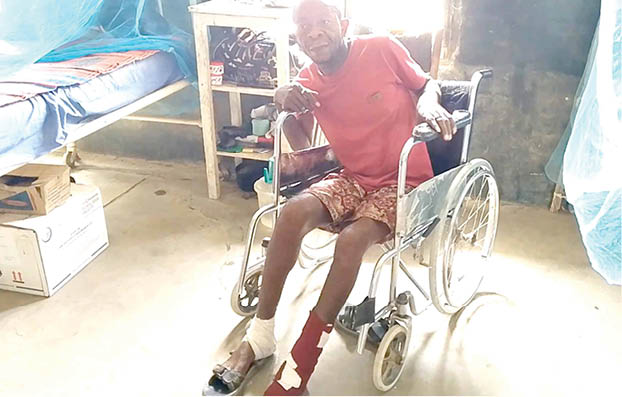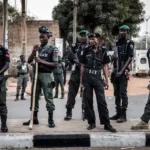In a temporary settlement where echoes of laughter have since faded, there live forgotten souls. The once vibrant citizens of this country have been abandoned to the mercy of harsh times and a chronic disease.
Some of them have their names lost to memory, but their stories, like the scars on their hands and legs, remain – silent but not actually gone.
Part of the story is about one man’s fight for dignity in the face of isolation, and the unexpected kindness from The Leprosy Mission Nigeria, Minna that brought light to his darkest days.
The heart-wrenching story of neglect and abandonment is of a 33-year-old David Felix, a native of Ebonyi State, who was diagnosed with leprosy and left by his family at the Leprosy Hospital, Chanchaga, Minna, the Niger State capital for the past 10 years.
- A story of communities living on bees
- 2027: Zoning takes front seat as early campaigns begin for Nasarawa guber race
Leprosy, according to the World Health Organisation (WHO), is a chronic infectious disease caused by a type of bacteria, mycobacterium leprae.
The disease mainly affects the skin and peripheral nerves, and if left untreated, it may cause progressive and permanent disability.
While health professionals said the disease could be treated with a multi-drug regimen, it has long been associated with stigma, fear and misunderstanding, causing many affected people to be isolated by society, including, in some cases, their own families.
Consequently, the plight of Felix comes amidst growing concerns over the social stigma attached to leprosy in communities. Medical experts have said that misconceptions surrounding the disease, such as the belief that it is highly contagious and untreatable, fuel lack of empathy and support for those who suffer from it.
Felix’s story mirrors the experiences of many people affected by leprosy, who face not only the physical burden of the disease but also the emotional trauma of being isolated from their loved ones.
His life has been in the hands of The Leprosy Mission Nigeria and medical officials of the Leprosarium Hospital in Chanchaga, Minna since April 2014.
His accounts have heightened concerns about the increasing societal stigma surrounding the disease and the moral responsibilities of families toward their members in times of illness.
Felix told Weekend Trust that someone introduced him to the Minna hospital after he had tried several native doctors in Ondo State, where he had worked as a businessman, and his home state, Ebonyi.
The man, who said he was still single, hopes to get married after the treatment. He said none of his family members had visited or called him since his admission to the hospital for the past 10 years.
While searching for a healer, Felix said a man he first met in his state promised to link him up with a pastor in Lagos for healing prayers, but instead, took advantage of his ailment and enriched himself. Nevertheless, he made his way to the Minna hospital through a Good Samaritan.
“I came to Minna Leprosy Hospital in April 2014, so I have spent 10 years in this health facility undergoing treatment.
“This illness started when I was working in Ondo State. I didn’t know that it was leprosy, so I started going from one native doctor to another, spending money unnecessarily. When it was becoming severe, I returned to a village in Ebonyi State.
“The Leprosy Mission Nigeria is currently bearing the financial cost of my treatment. None of my relatives has come here to see me. I haven’t married.
“I arrived at the Minna hospital through a brother from a neighbouring village, but he is not my biological brother. He volunteered to help me but ended up exploiting my ailment to enrich himself. He used me for business.
“When I went back to my village in Ebonyi State from Ondo, he came back from Lagos and told me that he had a pastor that could cure the ailment. He told me that the pastor had asked him to bring anybody who was not well and he would pray for him and he would get well. When I heard that, I was happy and informed my mother about it and she asked me to follow him to Lagos, hoping that I would be cured by the pastor.
“When we arrived in Lagos, he started carrying me around in a wheelchair, begging for money from one shop to another. And each time we went out to beg, he took ownership of the money while my legs continued to get bad. And for the time we spent in Lagos, he didn’t take me to his house; he lodged me in a hotel.
“During Easter in 2014, he asked us to relocate to Suleja in Niger State. And from Suleja, we moved to Minna. He told me that he had a wife in Minna. When we arrived in Minna, he lodged me in a hotel and went to stay with his wife. While in the hotel, one man told me of this hospital and directed me here.
“Since I moved to this hospital, he has not visited me because he did not want me to come here because of the money he was getting through my ailment. When I told him that someone had informed me of a leprosy hospital, he started fighting with me. I told him that if the hospital didn’t accept me, I would come back, but if they did, I would not follow him again. Luckily, when I arrived at the hospital, I was examined by health officials who assured me that I would be cured.
“While I was moving around towns and cities in Nigeria with my brother, he never allowed me to use my original town and state of origin. He said I should tell people that I was from Anambra State so that nobody would trace me. Also, he did not let me know how much we were making. Each time we closed, he held on to the money. He didn’t even allow me to come near him while counting the money.
“We went round many towns and cities in Nigeria begging for money, including Lagos, Suleja, Zuba, Akure. While he was pushing me in a wheelchair to beg, he wasn’t feeding me well. In fact, we always had problems. When I narrated this here in Minna, the authorities wanted to get him arrested but he ran away,” Felix recounted.
The leader of the leprosy community in Chanchaga, a 61-year-old Mallam Bello Umar, who came from Sokoto for the same treatment in 1990, lamented that people affected with the disease did not enjoy their fundamental rights as other categories of people living with disabilities. He said many of them could not return to their ancestral towns and villages because of stigma.
He revealed that it was while undergoing treatment that most of them found their life partners, adding that people hardly marry their daughters because of their ailment.
“We have been harassed several times by government officials who asked us to vacate where we currently live. They say the land belongs to the government and it was not given to us to build houses.
“We face a lot of stigmatisation and discrimination, both from the public and the government. Many people have lived here for years without their families coming to see them. After getting treated, some patients decided to find a wife here because even if they go back home, their families don’t associate with them for fear of contracting the disease. But we have been helping each other because we have similar illnesses.
“We have appealed to the Niger State government several times to get us a permanent residence as it has done for other categories of people living with disabilities. In Niger State, they have blind people’s homes, there are official residences for cripples, people with spinal cord injuries, but people affected by leprosy don’t have any residence provided by the government,” he said.
The community relations officer of The Leprosy Mission Nigeria, Habila Daniel Diko, lamented that people affected with leprosy were the most discriminated globally.
He said, “A lot of sensitisation needs to be done regarding leprosy. People need to know the cause and how to diagnose the disease.
“However, we have been holding disability outreaches, where we provide artificial legs for those who cannot help themselves. In 2023, we were able to produce over 50 artificial legs, free of charge; and this year, we have been able to provide over 30”.
Some hospital officials who spoke with Weekend Trust described the situation as pathetic.
One of the officials said, “When patients are brought here, we expect families to be their primary caregivers, but we noticed that they don’t visit or inquire about their conditions. That is what has happened to David Felix.”
The officials ensure that victims of the disease in their hospital always receive the necessary medical attention and care, Weekend Trust gathered.
Lamenting that drugs for the treatment of leprosy are not available at the open market, coupled with the unavailability of vaccines, a situation that compounds the challenges of patients, some advocates for the welfare of patients called for greater awareness, education and a support system to combat the stigma that accompanies the condition.
“We must educate people to know that leprosy is treatable and that those with the disease deserve the same rights and care as anyone else,” Diko, the community relations officer, The Leprosy Mission Nigeria, said.
Diko said vaccines to prevent the transmission of the disease were yet to be discovered globally and drugs were imported to Nigeria from the United Kingdom through only approved channels, such the National Tuberculosis and Leprosy Control Programme.
Some hospital officials also said there were still hidden cases in Niger State because of cultural practices that prevent people from going to modern health care facilities for immediate diagnosis and treatment, adding that if reported early, people with the disease can be helped and cured before their bodies deform.
They said the state recorded at least 10 new cases every year from various local government areas, especially Mashegu, Rijau, Magama and Rafi.
Weekend Trust reports that currently, there are 16 patients at the Minna hospital, comprising five females and 11 males.

 Join Daily Trust WhatsApp Community For Quick Access To News and Happenings Around You.
Join Daily Trust WhatsApp Community For Quick Access To News and Happenings Around You.

